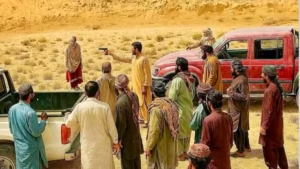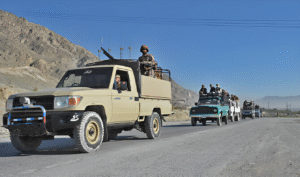
A deeply disturbing video has surfaced on social media, showing the cold-blooded murder of a young couple in Pakistan’s Balochistan province. The couple, identified as Bano Bibi and Ahsan Ullah, were reportedly killed in a so-called “honour” killing after marrying against the wishes of their families. The chilling footage has sparked nationwide outrage and renewed demands for stronger action against gender-based violence and tribal justice systems that override state law.
The video, believed to have been recorded just days before Eid al-Adha in May 2025, shows a convoy of SUVs and pickup trucks pulling up to a remote, barren area on the outskirts of Quetta, the provincial capital. From the vehicles, a crowd emerges, leading the couple—Bano with her head covered by a shawl—out into the open. The mood is tense. A copy of the Qur’an is handed to Pakistani Woman , symbolizing what is allegedly her last moment of dignity before execution.
In the footage, Pakistani Woman walks ahead alone, holding the holy book. Speaking in the regional Brahavi dialect, she calmly addresses a man following her: “Walk seven steps with me, after that you can shoot me.” The man complies. She then adds, “You are allowed only to shoot me. Nothing more than that.” Her chilling words—likely a plea to prevent further violation or humiliation—are followed by the sound of multiple gunshots. The man shoots her at close range, and after the third shot, Pakistani Woman collapses to the ground.
Moments later, more gunfire erupts, and the video shows the bloodied body of Ahsan Ullah lying beside Pakistani Woman‘s. In the background, a group of spectators can be heard cheering—further compounding the horror of the scene.

The brutal killing has sent shockwaves through Pakistan and beyond. Rights activists, public figures, and citizens have condemned the act, calling it a grim reminder of the country’s persistent struggle with patriarchal violence and impunity. The Human Rights Commission of Pakistan (HRCP) strongly denounced the murders and demanded urgent legal reform to protect individuals—particularly women—who challenge oppressive traditions.
ALSO READ : Bangladesh Air Force crashed into a school in Dhaka
Police investigations quickly identified 13 suspects in connection with the killings. Among those arrested are the tribal elder Sardar Satakzai, who allegedly ordered the execution, and Pakistani Woman‘s own brother, who reportedly approached the elder in protest over his sister’s marriage without family consent. According to Quetta police chief Naveed Akhtar, both the tribal leader and the brother played direct roles in the couple’s death.
“Justice Denied: How Tribal Power Undermines Pakistani Woman’s Rights in Pakistan”
(Pakistani Woman and Ahsan has once again spotlighted the dangerous intersection of tribal power)
This incident highlights the ongoing crisis of “honour” killings in Pakistan, particularly in tribal and rural areas where parallel justice systems often override formal legal protections. Despite efforts by the state to criminalize such acts, enforcement remains weak, and community pressure continues to silence victims and their supporters.(Pakistani Woman)
In 2024 alone, the HRCP recorded at least 405 cases of “honour” killings across the country. However, activists believe the actual numbers are significantly higher, as many incidents go unreported due to fear of retaliation or lack of access to justice.( Pakistani Woman )

The murder of Bano and Ahsan has once again spotlighted the dangerous intersection of tribal power, religious pretense, and systemic gender oppression. Human rights defenders are urging the Pakistani government to ensure that the arrested suspects are swiftly prosecuted and to implement more robust protections for women and couples who face threats from their own families and communities.
This case serves as a grim warning of what can happen when outdated customs and toxic masculinity are allowed to reign unchecked. The lives of Bano and Ahsan, cut short for choosing love over tradition, are now a symbol of both tragedy and the urgent need for reform.
